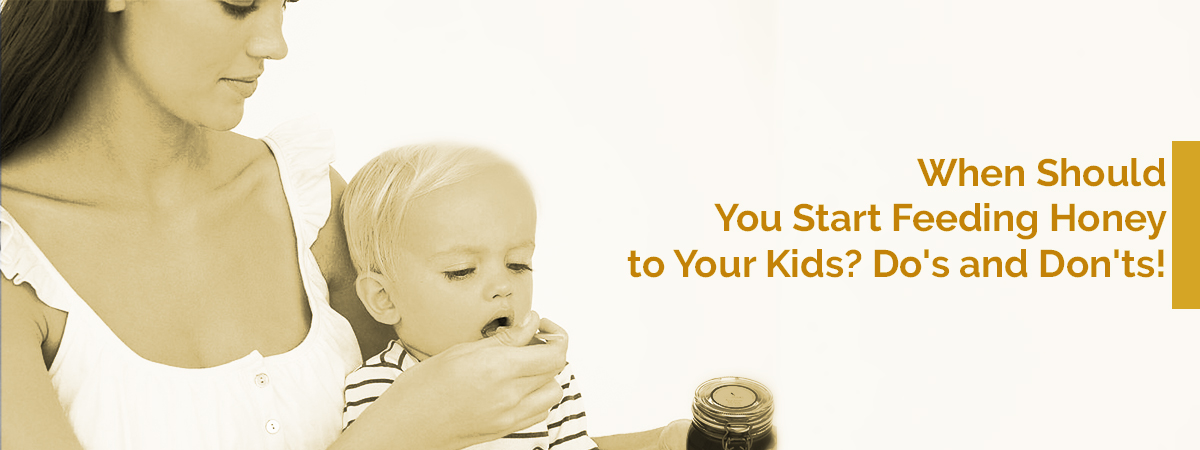- Tokyo : 09:59 |
- Singapore : 08:59 |
- Dubai : 04:59 |
- London : 00:59 |
- New York : 19:59 |
- Sydney : 11:59

“Honey has been a vital part of the human diet for so long. A small dose of honey can root a world of damage if not consumed at the right age. Not giving honey to the infants is a significant preventive health measure. The main concern behind this is infant botulism.”
Dubai, 14 August 2020: Parents are always concerned about the well being of their little ones. Living in a cautious society, they all are ultra-protective of their new-born babies. What to give and when to give is a question that goes in their mind always. Exposing the baby to new food items during 06 -12 months is another milestone as they want their infant to get enough nutrients and vitamins necessary for their growth and development. But one food item that should be avoided before 12 months of age is HONEY.
Honey, extracted from the nectar is one of nature’s best gifts with amazing medicinal properties. Despite the nourishing nature, honey should not be fed to babies less than 12 months of age. The natural raw honey is enormously beneficial for the children; however, it can prove bad for the infants.
The major risk of including honey in the diet of an infant too soon is Infant Botulism. Honey consist of bacteria spores known as Clostridium Botulinum. Botulism is a severe condition caused primarily by this bacterium and attacks the body's nerves.
The bacteria “clostridium” is found in soil and dust that contaminates the honey and when consumed by the babies can cause food-borne illnesses. Although botulism is a rare condition but a risky type of poisoning that affects the babies’ health. The digestive system of the infants is quite immature as compared to the adults and is not capable of fighting off this bacterium.
Babies that are under twelve months of age are more vulnerable to this illness if they are fed honey or anything with honey in it.
Generally, the first sign of infant botulism is constipation, typically followed with floppiness, weakness, and difficulty in sucking or feeding. It is a must to seek medical help if the baby shows any such symptoms. Constipation, lethargy, unusual crying, breathing difficulty, dehydration, and pneumonia are few other symptoms. Timely treatment of this illness can assist in preventing severe complications of infant botulism. The treatment is carried out by giving the botulism immune globulin through the baby's veins that work against the toxin.
Infant Botulism symptoms usually show up within 08-36 hours of eating contaminated food, and for some infants, it may not show any sign until a couple of weeks. 70% of the babies may require mechanical ventilation of an average of 23 days and a hospital stay of about 44 days to cure the illness completely. Another reason why one should avoid giving natural sweetener to the little ones is that it can damage their emerging teeth.
UAE’s National Health Service has indicated that it is not advisable to give honey in any form to the infants who are under 12 months of age. Pediatrician recommendations state that babies can consume honey once they are over a year old, and their first set of teeth has emerged completely. Parents should even stay away from the pasteurized honey packs since this process still can't reliably remove all the bacteria. Apart from this, it is a must to avoid foods that contain honey as an ingredient.
Honey pacifiers can also be dangerous for a baby below 12 months of age. There is a possible scenario of honey ingestion through the pacifier, which can pose a risk to the baby’s health.
Infant botulism mainly affects babies that are below 1 year, and honey is extremely safe for consumption by the toddlers that are over 18 months of age. Here are some of the noted benefits of consuming nutritious liquid honey.
Consumption of honey after a prescribed age provides instant relief from cold, flu, and cough. It strengthens the immune system of the babies and acts as a natural aid for sleep and eczema. It is the storehouse of multivitamins, essential amino acids, and minerals that effectively support regular bowel movements and enhance the health of the digestive system. Being rich in anti-bacterial properties, honey helps in healing the wounds faster. Along with providing the above benefits it promotes cognitive growth and improves mood levels. The fructose content present in the honey helps in maintaining high energy levels throughout the day.
It is never good to be in a hurry to introduce this natural sweetener in the baby diet. Do talk with the pediatrician about the food allergies risks and introduce honey in the baby’s diet gradually. Introducing honey slowly in the diet helps the infant get used to the taste while giving enough time for the body to adapt to the new food substance.
Although honey can have ample of benefits, however for babies under the age of 12 months, it proffers far more menace than benefits. Why risk something so serious, yet so preventable? Establishing a positive feeding relationship during infancy can offer lifetime benefits for the toddler's health. Luckily, infant botulism is a comparatively rare disease, but arming yourself with understanding about what is and is not safe for your baby can aid you to slash your child's risks of contracting it even further.
Company Name:
B A BARRY DMCC
Website: https://geohoney.com/
Email: info@babarry.com
Country: United Arab Emirates
Website:https://www.babarry.com/